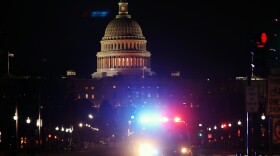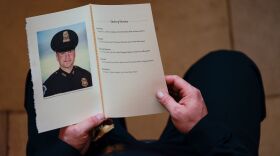Just over 700 people have been arrested and charged with crimes related to the deadly assault on the U.S. Capitol last Jan. 6. While thousands traveled from 45 states to Washington, D.C., Texas has the dubious distinction of having the second highest number of people arrested for their part in the attempt to overthrow a democratic election.
Sixty-three Texans have been arrested, according to George Washington University’s Program on Extremism.
Eleven of them have pleaded guilty, including Dallas resident Troy Smocks, who entered a plea deal in October on charges of threats in interstate commerce. He was sentenced to 425 days in jail and three years of probation — the longest sentence among all charged Texans.
Also among those sentenced is former Houston police officer Tam Dinh Pham of Richmond, who was arrested in the weeks that followed the attack.
Pham allegedly entered the Capitol building after attending former President Trump’s rally earlier that day. According to court documents, he initially denied any involvement in the riot, but backtracked after investigators searched through his “deleted” photos, where they found photos and videos “readily identifiable” as being taken inside the Capitol building.
Jenna Ryan of Frisco is serving a 60-day sentence which started Dec. 31. The real estate agent publicly dismissed any threat of prosecution in March.
“Definitely not going to jail. Sorry I have blonde hair white skin a great job a great future,” she wrote on Twitter. ”Sorry to rain on your hater parade. I did nothing wrong.”
In a recent interview with NBC News, Ryan likened her experience to that of “the Jews in Germany.”
Austin resident Joseph Barnes, who was arrested in February after being accused of entering the Capitol building, died in a motorcycle accident in June. His case has since been dismissed.
RELATED:At least 63 Texans face charges in the wake of the U.S. Capitol siege
So far, the vast majority of charges in Texans’ arrests are misdemeanors related to entering the Capitol. San Antonio resident Matt Mozzocco pleaded guilty to illegally parading, demonstrating or picketing in the Capitol building. He was sentenced to 45 days in prison and 60 months' community service.
Jon Lewis, a research fellow at George Washington University’s Program on Extremism, said many traveled with friends and family to D.C. to disrupt the certification of Joe Biden’s victory, like the five members of the Munn family — who traveled from the small town of Borger, Texas.
“Whether it's the Munn family or others this is something that mobilized not just individuals in ones or twos, but friends and family, which we have seen in literature as a driver of some of this radicalization,” he said.
More troubling are cases like Steve Cappucio and David Judd — two Texans who didn’t seem to know each other but were propelled by the “Big Lie” — Trump’s false claim that the 2020 election was stolen from him.
Cappucio and Judd allegedly attacked police officers with deadly weapons — hitting them with bats, batons and stolen riot shields in a sort of medieval warfare.
“It speaks to the fact that domestic violent extremism in this country has gone mainstream,” Lewis said. “That these ideas that political violence at the U.S. Capitol against Capitol Police and Metro Police with the intent to get into the Capitol Building and prevent the certification of a democratic election is somehow OK.”
Recent surveys show nearly three-quarters of the GOP believes the Big Lie — and it isn’t just that conspiracy that has gone mainstream: So have anti-government conspiracies, anti-COVID conspiracies, critical race theory conspiracies.
The fringe is no longer the fringe, said Mary McCord, former U.S. Attorney and current director of Georgetown University's Institute for Constitutional Advocacy and Protection. People can now say “my congressman said this or my state legislators said that.
“These are people in positions of power and privilege with a veneer of credibility that others who would otherwise be fringe are latching on to and using that as an empowerment to intimidate others,” she said.
Now emboldened, radical elements of the GOP have turned their eyes towards the folks that count the votes, harassing people until they quit and replacing them with election deniers.
“If election deniers are going to refuse to certify the votes to the legitimate winner if it's not the winner they want,” she said. “Then our democracy is in serious trouble.”
It is an election year in Texas and there is little chance you will hear the GOP talking about the importance of last year’s attack.
Unfortunately — extremism researchers say — downplaying the event is one of the worst things you can do.
Lucio Vasquez contributed to this report.
Copyright 2022 Texas Public Radio. To see more, visit Texas Public Radio.



























